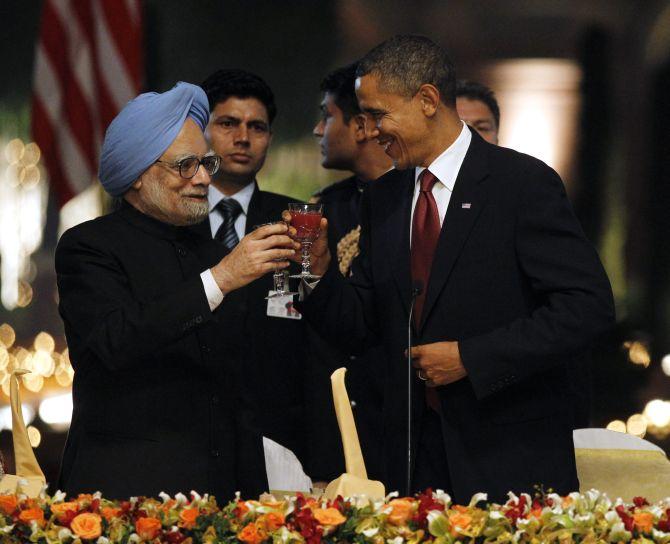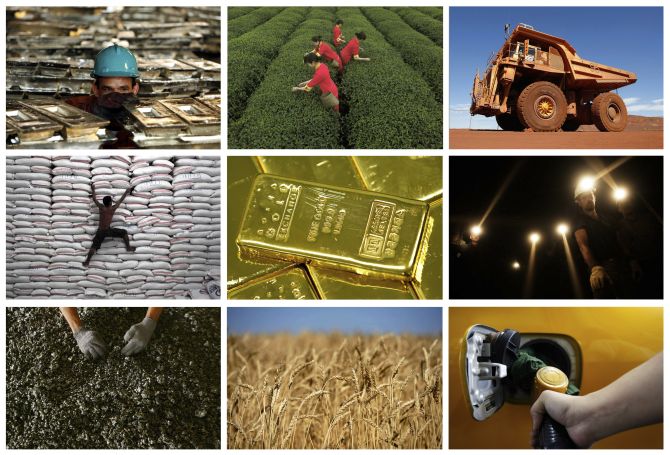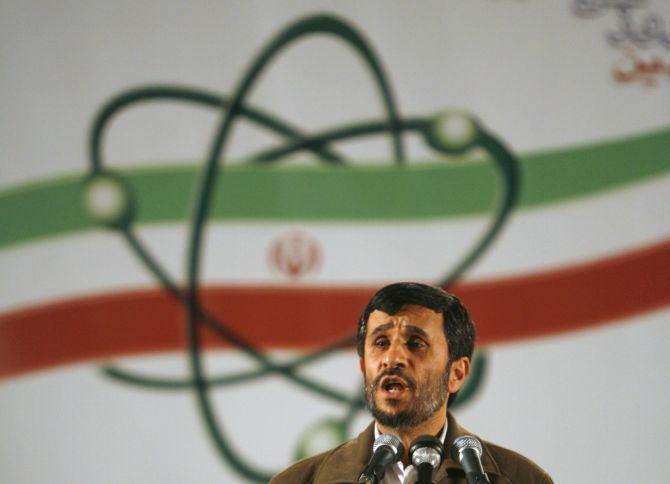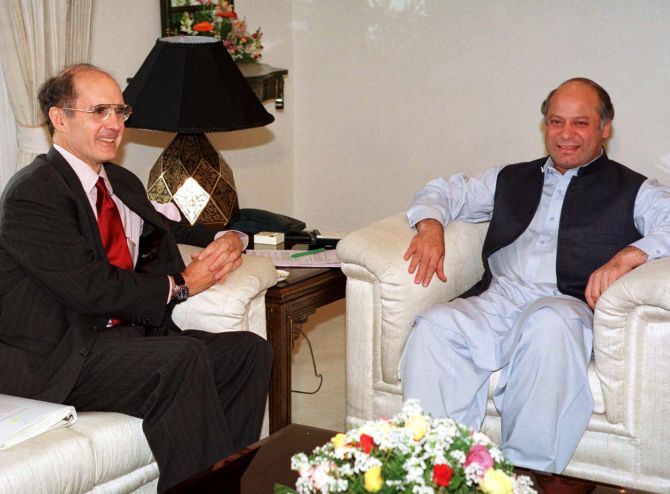 | « Back to article | Print this article |
'President Obama has a very, very, great respect for the prime minister'
As Prime Minister Manmohan Singh meets President Obama at the White House on Friday, September 27, former US Deputy Secretary of State Strobe Talbott, the man who set the ball rolling in transforming the United States-India relationship, tells Rediff.com's Aziz Haniffa why he believes US-India ties are ‘alive and healthy.’
Strobe Talbott, Deputy Secretary of State in the Clinton administration, was among the lead protagonists who transformed the United States-India relationship -- that was in the doldrums following India’s May 1998 nuclear tests -- into the strategic partnership it is today.
In many ways, the Strategic Dialogue between Talbott and then Indian external affairs minister Jaswant Singh was what rescued the relationship from the state it was in after Washington -- angered by the nuclear tests -- imposed punitive sanctions, which in turn led to President Clinton’s March 2000 visit to India that triggered the transformative changes that envisaged the strategic partnership that has blossomed since.
In an exclusive interview to Rediff.com’s Aziz Haniffa, ahead of Prime Minister Manmohan Singh’s visit to Washington, DC for a working summit with President Obama, Talbott – the winner of the inaugural India Abroad Friend of India Award two years ago -- rubbishes the notion in some quarters that the September 27 meeting is a meaningless exercise between lame duck leaders constrained by fractious domestic politics and declares that the US-India relationship is on a steady footing.
Talbott, now president of The Brookings Institution and chairman of the Obama administration’s Foreign Affairs Policy Board -- an advisory council to the Secretary of State -- says despite the hiccups in trade and India’s faltering economy, the commitment in Washington toward this strategic partnership is unshakeable and the respect for Dr Singh is immense, beginning with President Obama himself for the person who was the author of India’s economic reforms.
Click NEXT to read the interview…
'US government, private sector would like improvement in trade'
What is your take on the state of play in US-India relations today?
My sense is -- and we’ll come to the clouds on the horizon, which are economic and there are some geopolitical ones and so forth and I keep pretty close touch with the Secretary of State among others whom I’ve talked to on several occasions about India before his trip to India and after this trip to India -- is the relationship is on basically very steady ground and that’s a large measure because we now have three successive administrations, which are committed to it -- two Democratic administrations and a Republican administration.
There are lots of differences among the foreign policies of Bill Clinton, George W Bush and Barack Obama, but on India, it’s sort of steady as we go.
Now you know, there are no spectacular developments in the offing, but I know that the people who are preparing for the prime minister’s visit told me first of all, that President Obama has a very, very, great respect for the prime minister.
For all kinds of reasons, there is a feeling that the relationship is healthy – that it’s alive and healthy.
It could get better in some areas, trade for instance, and where my sense is the US government and the US private sector would like to see some further improvement.
It’s probably the hardest single area of the bilateral relationship right now, but if you look at it in context, we’ve made a lot of progress. I don’t know exactly what the figures are, but my sense is that over the last 10 years, our trade has expanded about five-fold, but it would be great to be able to, for example, announce the resumption of the Trade Policy Forum under (US Trade Representative) Mike Froman on our side, who I know quite well and who is dedicated to trying to do more on that.
I am speaking not on behalf of anybody but myself here, that the Indian side could contribute to an outcome that would be mutually beneficial if there could be more progress on the WTO (World Trade Organization).
Much of the reasons for the pessimism is because India’s economy has apparently tanked.
There is also this angst in US business about various Indian regulations from taxes to lack of insurance, banking, financial reforms.
With all these problems, do you hold out any optimism for any progress in the near term?
I’ve been following India for decades and I remember going to India on one of my very first trips when I was Deputy Secretary of State in the early 1990s when the current prime minister was the finance minister and India was just beginning to kind of open up to the world.
Since then there’s been immense progress, and by the way, there are a lot of countries, including the United States, that wouldn’t mind having a 4.5 percent or 5 percent growth rate right now.
I know it ain’t 8.5 percent and I am very conscious of what’s happening to the rupee. Among other things, this is a reflection of the trade imbalance, and the Indian government is clearly aware that it needs to do more to attract new investment.
There are concerns in the global community of investors over what are seen as protectionist policies and uncertain and unpredictable tax policies and bureaucratic obstacles.
That goes back to why I believe the trade issue is going to be there in the middle of the table, not least because Prime Minister Singh knows the economy so well.
Click NEXT to read further...
'Unfortunate that nuke deal became centerpiece of how India-US relationship was going to be'
Do you foresee anything tangible that could address these concerns before the Indian elections?
I don’t want to either predict or preach, but my sense is that it would be very helpful if there could be some progress at the WTO and that is only going to be possible if the Indian government is a little more forward-leaning than it now is.
Also my sense -- and again, I don’t want to predict and I don’t want to prescribe -- but there could be some movement on one of the global issues that is of great concern to everybody on the planet and it could be resolved if there is a high degree of synchronisation and cooperation among the United States, India, China and the EU (European Union), and that’s climate change.
You know, of course, that the presidential summit between President Obama and (Chinese) President Xi Jinping produced an agreement on -- or at least the basis for an agreement on HFCs (Hydrofluorcarbons) and it would be terrific to get India on board.
Secretary Kerry didn’t get very far on that when he was in Delhi, but maybe he laid the ground for some progress that could be made at the level of the President and the prime minister.
One of the biggest disappointments has been the nuclear deal continuing to be in limbo in terms of implementation.
I know you were strongly opposed to it at the beginning, but once it was signed, you were on board.
Now with the Indian Parliament passing the nuclear liability law, which has caused much concern to US business and industry, this so-called transformational deal has been stuck for more than five years.
Yes, and you know Aziz, you and I have been talking to each other from time to time, not as often as I’d like, maybe not as often as you’d like, for as longer than five years, and I have had a consistent view on this.
I believe it was unfortunate that for a long period of time the disagreement between the United States and India over the NPT (nuclear Non Proliferation Treaty) and the CTBT (Comprehensive Test Ban Treaty) and nuclear policy was so central to the relationship.
So, it was a welcome development to me that we passed out of that era and we had the civil nuclear deal, which was, of course, overwhelmingly supported by Congress.
But I thought it was unfortunate to the extreme that the disagreement over nuclear weapons policy was so central to the US-Indian relationship in a negative way and I was also worried when the nuke deal became the centerpiece -- the litmus test -- for how wonderful the relationship was going to be.
I said that to you in past conversations you and I have had, including ones that you’ve printed. I believe we should not sort of make that the central issue, where India is…the cliche is that Indian is an emerging power, what does it mean?
It means that it’s not just emerging in its economic clout, it means that it’s emerging in the multiplicity of issues of a global nature where India can play a vital role.
And, that’s I think …and trade is certainly one, energy and climate is another, and when I was assessing the nuke deal, once upon a time during the Bush administration, I could see that there was going to be some obstacles, including obstacles on the Indian side as a result of parliamentary actions and there we are.
So anybody who is fixated -- whether he’s an Indian or an American on that issue -- is going to feel a little low about how the relationship is going. (But) Those of us who think that that is a piece of the relationship, but should not as it were, drag the rest of the relationship down, are advocating progress in other areas.
Click NEXT to read further...
'India could be more helpful than it was being on the Iran issue'
The United States, with President Obama himself describing the US-India relationship as one of the defining partnerships of the 21st century, has held out hope of not just a major bilateral strategic partnership, but India playing a major geopolitical role.
But India with its adherence to concepts like strategic autonomy as an integral part of its foreign policy agenda has hardly been forthcoming to Washington’s overtures in this regard.
How disappointing is this to Washington vis-à-vis being unable to co-opt India to be a partner in the geopolitical issues of the day?
A couple of things. First of all, the chemistry between the two men is very important and they will be able of speaking in each case, downwards to the subordinates to get some movement on the tough issues.
For example, there’s a pretty good chance that there will be -- not a transformative breakthrough on the nuclear issue -- but maybe a contract of some kind between Westinghouse and NPCIL (the Nuclear Power Corporation of India Limited), so there’s that.
On the big geopolitical issues -- and I am going to speak completely for myself here -- there were times when the United States, and I felt this as well, that India could be more helpful than it was being on the Iran issue.
Right now, the preoccupation is Syria and that will be true -- you could be sure --when Prime Minister Manmohan Singh is here. The preoccupation will be Syria, Syria, Syria, and again, speaking entirely on a private capacity, it’s just as well that India isn’t saying very much officially about that.
If I can put it this way, India is kind of taking a pass and that’s fine because I have a feeling where speaking out with a loud voice, it wouldn’t necessarily be helpful to what President Obama believes is the only sensible path forward, which is obviously holding out the threat of force in order to make the diplomacy effective.
The US also believes it’s an Asian-Pacific era and is pivoting toward this region and wants India to play a leadership role in this policy. But is this hoping for far too much?
I am not a big fan of the pivot to Asia. I’d rather -- just in terms of vocabulary prefer the tag line that came out of the State Department, which is a kind of re-balancing towards Asia. But two points.
First of all, (ex-Beatle, the late) John Lennon, one of my favorite philosophers, had a line -- probably a line from a song -- that life is what happens while you are making other plans, which is to say that the unfolding reality doesn’t always vindicate great strategic thinking about where we should be going in the future.
Now, there is no question that Asia is growing in importance, but there is also no question that the greater Middle East or what Indians call West Asia is going to demand a huge amount of attention because there are huge problems and challenges there.
So, to take this back to the importance of India, there are essentially four reasons why India is so important to the United States and I would start with the one that is a cliché, but it also true and that is, we are the oldest modern democracy and India is the world’s largest democracy -- we have shared values.
And, shared values tend to undergird shared interests. Over the last 20 plus years, going back to the reforms that Finance Minister Manmohan Singh introduced under the (then prime minister P V Narasimha) Rao government, India has emerged into the world as an economic power.
Then, of course, there is the fact that India is emerging as an Asia-Pacific power as well. It’s getting more involved in the ASEAN regional forum.
The East Asians -- and here I am talking about countries other than China -- the Japanese, the Koreans, the ASEANs, the Taiwanese -- they want to see India out there and we, the United States want to see India increasingly as a Pacific presence.
Now, what one has to do is look at a globe of the world, and guess what, India is also right up there against West Asia, which doesn’t mean that India is a West Asia power, but it means that you got a perspective, you got a huge number -- a very large Diaspora as well, and so, you have a lot of interests and will have influence over time, and you’ll also be a kind of role model.
The big problem in the Arab and Islamic world right now, including unfortunately in India’s neighbour to the north, is sectarian tension within Islam. The Shia-Sunni thing -- the schism -- is now tearing countries apart.
One of the great things about India is that India is a synchronistic civilizational State that has found ways of making a virtue out of the diversity of its 1.2 billion citizens, and that can be a model for what is making the Middle East/West Asia such a preoccupation for all of us these days.
Click NEXT to read further...
'Nawaz Sharif is serious about improving India-Pakistan relations'
In this regard, isn’t it a no-brainer that India will constrain itself since there is paranoia in China that this is all a containment strategy and India obviously will want no part of it?
India should not want to be any part of that.
When Secretary (of State, Condoleezza) Rice, whom I know personally and have known for years, and admired very much -- that doesn’t mean I’ve agreed with everything that she said -- wrote an article and I am sure it got a lot of attention in Foreign Affairs back during the 2000 presidential campaign in which she explicitly said we should improve our relations with India as a strategic counterweight to China.
Bad idea. It’s bad for everybody. It arouses paranoia or defensiveness that could be offensive in China. It’s the last thing in the world that India wants -- they do not want to be seen as a card that the United States is playing in a game of poker against China and it is something the United States shouldn’t want.
And that takes us back to what I said earlier in the context of the climate change and energy issue, but it applies to other global issues as well.
There is no question that in the 21st century, one of the characteristics of the 21st century, is that a healthy, mutually beneficial, a win-win-win relationship, among the two Asian giants and the United States of America with cooperation on big issues and big problems will increase the chances of this being a good century for us and our children.
Coming to India-Pakistan relations, are you encouraged by Nawaz Sharif’s return as prime minister of Pakistan?
I’ve worked very closely with Nawaz Sharif when he was prime minister in the late 1990s, more or less in parallel when I was conducting the strategic dialogue with Jaswant Singh.
Now, I didn’t see anywhere near as much of Nawaz Sharif and his colleagues as I did of my Indian counterparts, and particularly Jaswant Singh because there was a lot more being accomplished in the US-India channel than in the US-Pakistani channel.
I’ve seen enough of Nawaz Sharif over the years to believe that he is serious about wanting to harness his return to power in a way that is constructive vis-à-vis improving India-Pakistan relations.
But there is also no question that he’s getting push-back or pull-back -- whatever you want to call it -- from shall we say the usual suspects. So, the jury is still out…
What I’m about to say isn’t to cast doubt on his sincerity, but the jury is still out on whether he is going to be able to deliver the powerful constituencies within his own country to translate his positive statements into real improvement.
We all are aware that there have been some worrying incidents back and forth across the Line of Control, and thank god it hasn’t escalated beyond that and both leaderships – the Indian government and the Nawaz Sharif government --have done a good job at sort of tamping down any hotheads on either side for that matter.
Coming back to the Manmohan Singh-Obama summit, there are cynics who argue that for all the happy talk and chemistry, the whole exercise would be meaningless.
Nonsense. Absolute nonsense. The prime minister of India is an extraordinarily accomplished person and he is not just a respected figure around the world, he’s is a particularly respected figure because of the long career he’s had, the contributions that he’s made in the past, the contributions he’s making at present.
But obviously, he, like President Obama, is in the center of the storm of extremely fractious domestic politics that simply comes with the territory of being healthy democracies.
TOP photo features you missed last week
Click on MORE to see another PHOTO features...





